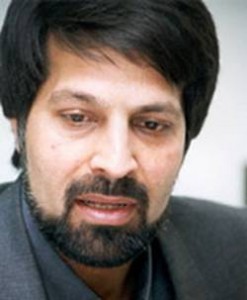Sunday
Apr042010
The Latest from Iran (4 April): Renewal
 Sunday, April 4, 2010 at 22:27
Sunday, April 4, 2010 at 22:27  2225 GMT: Political Prisoner Watch. Javad Sharafkhani, the spokesperson for Mir-Hossein Mousavi’s election campaign in Ilam province in western Iran, has been arrested.
2225 GMT: Political Prisoner Watch. Javad Sharafkhani, the spokesperson for Mir-Hossein Mousavi’s election campaign in Ilam province in western Iran, has been arrested.2220 GMT: We'll Get You (Even If You're Outside Iran). Minister of Justice Morteza Bakhtiari has announced that a special prosecutorial branch will be established shortly to deal with Iranians residing abroad.
NEW Iran Exclusive: Detained Emad Baghi in Poor Health, House Raided, Relative Beaten
NEW Video: Obama on Iran, Health Care (2 April)
Iran: 4 Ways the US Can Help the Green Movement (Shahryar)
The Latest from Iran (3 April): Celebration
2215 GMT: Economy Watch. Mehdi Aqdaie, the deputy director of Iran's Privatisation Organization, has said that Iran hopes to raise about $12.5 billion by privatising more than 500 state firms during the 2010-11 year, including two refineries and two car makers.
1835 GMT: Propaganda Watch. Press TV --- bless 'em --- get it right this time. A day after headlining the Foreign Minister Manouchehr Mottaki's statement with the prospect of nuclear annihilation, they correctly frame today's Mottaki declaration, which says nothing new: "Mottaki Calls For Global Nuclear Disarmament".
1445 GMT: Rafsanjani Watch. Radio Farda reports that Hossein Marashi, a close political ally of Hashemi Rafsanjani and a cousin of Rafsanjani's wife, has been sent to jail again. Marashi, who has been given a one-year sentence, was detained last month but freed after a few days.
1420 GMT: Bayat-Zanjani and the Political Prisoners. Ayatollah Bayat-Zanjani, meeting the families of political prisoners, has said:
I am shocked that [our leaders] don’t learn from the fate of the rulers that came to power and fell throughout history? Why should one ignore the lessons learned from the past and commit the same wrong actions against the best of the people? Know this that the struggle to stay in power by any means possible requires confrontations such as what is being done against you. You are oppressed and the prayers of the oppressed will be answered.
1405 GMT: More Subsidy Fun. The Iranian Parliament has reconvened after the New Year break, and already battle has been joined over the President's insistence that he get more revenues from subsidy cuts.
Speaker Ali Larijani, Speaker of the Parliament announced that discussions have been "finalised", although the Parliament will “collaborate closely with the Government giving close attention to its views and reasoning.”
Defying Larijani, however, a group of MPs announced that they have prepared a new proposal for allocation of $35 billion from cuts instead of the already approved $20 billion. Ruhollah Hossenian, a fervent Ahmadinejad supporter, said that the proposal has already been signed by 100 legislators.
1320 GMT: Political Prisoner Watch. Journalist and human rights activist Abolfazl Abedini has been sentenced to 11 years in prison.
There are concerns over the poor health of Farid Taheri, a member of the Freedom Movement of Iran detained on 27 January and held in Section 350 of Evin Prison.
The status of Ehsan Mohrabi of Farhikhtegan newspaper is unknown.
Jahangir Abdollahi, a Masters student in political science at Tehran University, is under pressure in Evin Prison to confess.
1045 GMT: We have posted absolutely reliable, disturbing information on the poor health of detained journalist Emaduddin Baghi and the harassment of his family.
1040 GMT: Rafsanjani Watch. A new Rah-e-Sabz documentary highlights the role of Hashemi Rafsanjani in post-election events and attempts by the regime to limit his public intervention.
0830 GMT. And More Subsidy Clashes. Gholam-Reza Mesbahi-Moghaddam of Parliament's Economic Committee has said that the Ahmadinejad Government is seeking to delay the implementation of the subsidy reform plan. Parliament only gave the President $20 billion of the extra $40 billion in revenues he was seeking from subsidy cuts.
0825 GMT: Oil Crunch. Could disinvestment in Iran's oil production (see 0615 GMT) become a crisis? Consider the half-empty, half-full spin of the Government.
Iran's Oil Minister Masoud Mirzakemi says the country needs $200 billion in investment in the oil sector. However, the head of Iran's Committee for Transportation and Fuel Management insists the country is capable of becoming self-sufficient in gasoline production this year.
0815 GMT: Press TV Funnies. Yesterday, the Iranian media outlet featured a headline which indicated Iran's Foreign Minister was supported nuclear annihilation (see our 0730 GMT update on Saturday). We are encouraged that Press TV staff are reading Enduring America since, soon after we noted this, the headline was changed to "FM: Iran Strongly Supports Elimination of Nukes".
Today, bless 'em, Press TV is chronologically confused over Iran's promotion of a nuclear-free world:
Iran's Foreign Ministry Spokesman Ramin Mehmanparast says Tehran's international conference on nuclear disarmament has been widely welcomed.
According to Mehmanparast, the conference dubbed "Nuclear energy for all, nuclear weapons for none,” will be held in Tehran on March 17th and 18th.
0715 GMT: Photo of Day (see inset). Behzad Nabavi, the prominent reformist sentenced to five years in prison, and his wife enjoy the last days of his temporary release.
0713 GMT: Movies and Rights. Activist Shadi Sadr has received Amnesty International's "Golden Butterfly" award for appearance in film Women in Shroud. Sadr writes, "I believe [this] is for all activists of the “Stop Stoning Forever Campaign” –-- both those who appeared in the documentary film...and those who didn’t."
Bahman Ghobadi, the director of the drama-"documentary" No One Knows About Persian Cats, received two awards from the international film festival in the Netherlands.
0710 GMT: Renewal. The cultural newspaper Farhang-e-Ashti has reappeared after its suspension and the arrest of a number of its journalists.
0705 GMT: InsideIRAN offers an overview of the emergence of the women's movement:
It is certainly too soon to draw conclusions or write endings for a fragile movement that has been under increasing pressure, but just like other aspects of the green movement, it is the outreach of the women’s movement within society that gives it strength and prominence. Despite the heavy crackdown on some of its most notable leaders, as long as fourteen-year-old girls across Iran are engaging in conversation, it will be an ongoing struggle and a voice that cannot be silenced.
0650 GMT: Political Prisoner Watch. Green Voice of Freedom publishes the names and sentences of 26 "lesser-known" detainees in Section 350 of Evin Prison.
Kalemeh warns of the declining health of journalist Mohammad Nourizad. Arrested on 20 December, Nourizad suffers from a heart problem and diabetes.
Nourizad wrote for the pro-government Kayhan but became a vocal critic of the regime after the 12 June election.
Baha’i photographer and musician Artin Ghazanfari has been released on $50,000 bail.
0640 GMT: Interviewed by Rah-e-Sabz, Farrokh Negahdar of the socialist Organization of Iranian People's Fedayyin supports non-violent protests, with constant pressure for change of laws and expansion of the popular base, especially amongst workers.
0615 GMT: A Happy Easter Day to all those celebrating the occasion.
More on yesterday's visits by hundreds of reformists to former President Mohammad Khatami. Khabar Online --- far from a reformist publication --- offers two articles, providing a list of visitors and observing that visits continued even after the noon prayer. Indeed, not all those stopping by were reformists; several visitors came in Government cars, indicating they are currently serving in the Ahmadinejad administration.
Mohammad Javad Haghshenas, the publisher of Mehdi Karroubi's now-banned newspaper Etemade Melli, has said that reformists should seek an understanding with "hardliners", while expanding their popular base of support.
The prominent academic Sadegh Zibakalam has evaluated that further sanctions against Iran are inevitable; China can lessen but not prevent them.
On the economic front, in a sign that company disinvestment from Iran is having an effect, Hamid Hosseini of the Chamber of Commerce complains about insufficient participation of the private sector in the oil industry.
tagged  Abolfazl Abedini,
Abolfazl Abedini,  Ali Larijani,
Ali Larijani,  Artin Ghazanfari,
Artin Ghazanfari,  Ayatollah Bayat-Zanjani,
Ayatollah Bayat-Zanjani,  Bahman Ghobadi,
Bahman Ghobadi,  Behzad Nabavi,
Behzad Nabavi,  China,
China,  Ehsan Mohrabi,
Ehsan Mohrabi,  Emaduddin Baghi,
Emaduddin Baghi,  Etemade Melli,
Etemade Melli,  Farhang-e-Ashti,
Farhang-e-Ashti,  Farhikhtegan,
Farhikhtegan,  Farid Taheri,
Farid Taheri,  Farrokh Negahdar,
Farrokh Negahdar,  Freedom Movement of Iran,
Freedom Movement of Iran,  Gholam-Reza Mesbahi-Moghaddam,
Gholam-Reza Mesbahi-Moghaddam,  Hamid Hosseini,
Hamid Hosseini,  Hashemi Rafsanjani,
Hashemi Rafsanjani,  Hossein Mar'ashi,
Hossein Mar'ashi,  Iran,
Iran,  Iran Elections 2009,
Iran Elections 2009,  Javad Sharafkhani,
Javad Sharafkhani,  Kalemeh,
Kalemeh,  Mahmoud Ahmadinejad,
Mahmoud Ahmadinejad,  Manouchehr Mottaki,
Manouchehr Mottaki,  Masoud Mirzakemi,
Masoud Mirzakemi,  Mehdi Aqdaie,
Mehdi Aqdaie,  Mehdi Karroubi,
Mehdi Karroubi,  Mohammad Javad Haghshenas,
Mohammad Javad Haghshenas,  Mohammad Khatami,
Mohammad Khatami,  Mohammad Nourizad,
Mohammad Nourizad,  Morteza Bakhtiari,
Morteza Bakhtiari,  No One Knows About Persian Cats,
No One Knows About Persian Cats,  Organization of Iranian People's Fedayyin,
Organization of Iranian People's Fedayyin,  Press TV,
Press TV,  Rah-e-Sabz,
Rah-e-Sabz,  Ramin Mehmanparast,
Ramin Mehmanparast,  Ruhollah Hosseinian,
Ruhollah Hosseinian,  Sadegh Zibakalam,
Sadegh Zibakalam,  Women in Shroud,
Women in Shroud,  insideIRAN in
insideIRAN in  Middle East & Iran
Middle East & Iran
 Abolfazl Abedini,
Abolfazl Abedini,  Ali Larijani,
Ali Larijani,  Artin Ghazanfari,
Artin Ghazanfari,  Ayatollah Bayat-Zanjani,
Ayatollah Bayat-Zanjani,  Bahman Ghobadi,
Bahman Ghobadi,  Behzad Nabavi,
Behzad Nabavi,  China,
China,  Ehsan Mohrabi,
Ehsan Mohrabi,  Emaduddin Baghi,
Emaduddin Baghi,  Etemade Melli,
Etemade Melli,  Farhang-e-Ashti,
Farhang-e-Ashti,  Farhikhtegan,
Farhikhtegan,  Farid Taheri,
Farid Taheri,  Farrokh Negahdar,
Farrokh Negahdar,  Freedom Movement of Iran,
Freedom Movement of Iran,  Gholam-Reza Mesbahi-Moghaddam,
Gholam-Reza Mesbahi-Moghaddam,  Hamid Hosseini,
Hamid Hosseini,  Hashemi Rafsanjani,
Hashemi Rafsanjani,  Hossein Mar'ashi,
Hossein Mar'ashi,  Iran,
Iran,  Iran Elections 2009,
Iran Elections 2009,  Javad Sharafkhani,
Javad Sharafkhani,  Kalemeh,
Kalemeh,  Mahmoud Ahmadinejad,
Mahmoud Ahmadinejad,  Manouchehr Mottaki,
Manouchehr Mottaki,  Masoud Mirzakemi,
Masoud Mirzakemi,  Mehdi Aqdaie,
Mehdi Aqdaie,  Mehdi Karroubi,
Mehdi Karroubi,  Mohammad Javad Haghshenas,
Mohammad Javad Haghshenas,  Mohammad Khatami,
Mohammad Khatami,  Mohammad Nourizad,
Mohammad Nourizad,  Morteza Bakhtiari,
Morteza Bakhtiari,  No One Knows About Persian Cats,
No One Knows About Persian Cats,  Organization of Iranian People's Fedayyin,
Organization of Iranian People's Fedayyin,  Press TV,
Press TV,  Rah-e-Sabz,
Rah-e-Sabz,  Ramin Mehmanparast,
Ramin Mehmanparast,  Ruhollah Hosseinian,
Ruhollah Hosseinian,  Sadegh Zibakalam,
Sadegh Zibakalam,  Women in Shroud,
Women in Shroud,  insideIRAN in
insideIRAN in  Middle East & Iran
Middle East & Iran 



